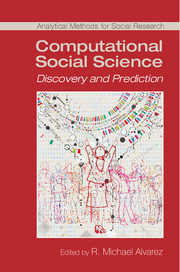Book contents
- Frontmatter
- Contents
- Preface
- Introduction
- PART 1 COMPUTATIONAL SOCIAL SCIENCE TOOLS
- PART 2 computational social science applications
- 7 Big Data, Social Media, and Protest: Foundations for a Research Agenda
- 8 Measuring Representational Style in the House: The Tea Party, Obama, and Legislators’ Changing Expressed Priorities
- 9 Using Social Marketing and Data Science to Make Government Smarter
- 10 Using Machine Learning Algorithms to Detect Election Fraud
- 11 Centralized Analysis of Local Data, with Dollars and Lives on the Line: Lessons from the Home Radon Experience
- Conclusion Computational Social Science: Toward a Collaborative Future
- Index
7 - Big Data, Social Media, and Protest: Foundations for a Research Agenda
from PART 2 - computational social science applications
Published online by Cambridge University Press: 05 March 2016
- Frontmatter
- Contents
- Preface
- Introduction
- PART 1 COMPUTATIONAL SOCIAL SCIENCE TOOLS
- PART 2 computational social science applications
- 7 Big Data, Social Media, and Protest: Foundations for a Research Agenda
- 8 Measuring Representational Style in the House: The Tea Party, Obama, and Legislators’ Changing Expressed Priorities
- 9 Using Social Marketing and Data Science to Make Government Smarter
- 10 Using Machine Learning Algorithms to Detect Election Fraud
- 11 Centralized Analysis of Local Data, with Dollars and Lives on the Line: Lessons from the Home Radon Experience
- Conclusion Computational Social Science: Toward a Collaborative Future
- Index
Summary
INTRODUCTION
The past decade has witnessed a rapid rise in the use of social media around the globe. For political scientists, this is a phenomenon begging to be understood. It has been claimed repeatedly – usually in the absence of solid data – that these social media resources are profoundly shaping participation in social movements, including protest movements (see Bond, Fariss, Jones, Kramer, Marlow, Settle, & Fowler 2012; Cha et al. 2010; Jungherr, Jurgens, & Schoen 2012; Lynch 2011; Shirky 2011). Social media are often assumed to affect an extremely wide range of individual-level behaviors, including communicating about politics to friends and family members, donating or soliciting money for political campaigns and causes, voting, and engaging in collective forms of protest. In truth, however, the research community knows remarkably little about whether (and especially how) the use of social media systematically affects political participation.
Perhaps nowhere is this lack of knowledge more clear than in the matter of political protest. In recent years, the use of social media has been linked to the spread of political protests in cities around the world, including Moscow, Kiev, Istanbul, Ankara, Cairo, Tripoli, Athens, Madrid, New York, and Los Angeles. Obviously, social protest itself is far from new, but the fact that it is possible for potential protest participants, as well as geographically removed observers, to access real-time accounts of protest behavior documented and archived through micro-blogging (e.g., Twitter) and social media (e.g., Facebook) websites is a novel phenomenon. Protest activities are flagged by participants themselves with distinctive hashtags on Twitter. As political scientists, then, the question of how these activities on social media actually affect the decision of individuals to participate in protests would seem to be a subject ripe for research, as too is the macro question of how social media changes the nature of protest itself.
As is often the case in both popular and scholarly commentary, new phenomena inevitably engender a counternarrative, claiming that the phenomenon is either not new or not important. The rise of social media – and the concurrent level of fascination accorded to it across the media spectra – and its relationship to mass protests movements have been no exception in this regard.
- Type
- Chapter
- Information
- Computational Social ScienceDiscovery and Prediction, pp. 199 - 224Publisher: Cambridge University PressPrint publication year: 2016
- 13
- Cited by

